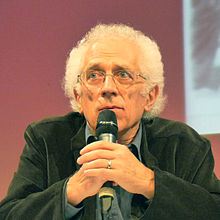Tzvetan Todorov
Bulgarian historian, philosopher, structuralist literary critic, sociologist and essayist (1939-2017)
Tzvetan Todorov (1 March 1939 - 7 February 2017) was a Bulgarian-French historian, philosopher, structuralist literary critic, sociologist, essayist and geologist.

| This article about a person or group of people is a stub. You can help out with Wikiquote by expanding it! |
Quotes
editReading as Construction (1980)
edit- As translated from French by Marilyn A. August
- Nothing is more commonplace than the reading experience, and yet nothing is more unknown. Reading is such a matter of course that at first glance it seems there is nothing to say about it.
Hope and Memory: Reflections on the Twentieth Century (2003)
edit- As translated by David Bellos ISBN 1843543605
- Democracy brought to others through the barrel of a gun is not democracy; to impose it by force is to undermine it.
- Preface to the English edition (October 2002), p. xxi
- Pride is not a wise counselor. People who believe themselves to be the incarnation of good have a distorted view of the world. The absence of any obstacle to the deployment of strength is dangerous for the strong themselves: passion takes precedence over reason. "No power without limit can be legitimate," as Montesquieu wrote long ago. Political wisdom does not consist in seeking only immediate victory, nor does it require systematic preference of "us" over "them."
- Preface to the English edition (October 2002), p. xxi
- A maxim for the twenty-first century might well be to start not by fighting evil in the name of good, but by attacking the certainties of people who claim always to know where good and evil are to be found. We should struggle not against the devil himself but what allows the devil to live — Manichaean thinking itself.
- Ch. 5 : The Past in the Present, p. 195
- paraphrased variant:
- We should not be simply fighting evil in the name of good, but struggling against the certainties of people who claim always to know where good and evil are to be found.
The New World Disorder: Reflections of a European (2005)
edit- American society has always exercised a stronger pressure on individual behavior than Western European societies; but in time of war this pressure is notched a few degrees, and starts to become quite alarming.
Quotes about Todorov
edit- Fantasy changes the world deliberately, allowing impossible things which science fiction at least pretends not to allow. Yes, I say "what if magic worked, and then...," and "what if there were dragons... yes. Then you just follow out, you just follow the fictional enterprise like any novelist, it seems to me, and the more detailed and accurate you are, the better the book will be. And of course, the tricky thing about imaginative fiction, both science fiction and fantasy, is the coherence of the imagination, because you are making a whole world out of words only. It's all made to hold together. Tolkien is very clear about that in some of his essays. He's the best theorist of fantasy I know, actually, Tolkien himself. The European fantasy theorists, Todorov, and those people, they are terrible, terrible. The works they are talking about always seem so insignificant to me. That's not what I mean by fantasy.
- 2002 interview in Conversations with Ursula Le Guin